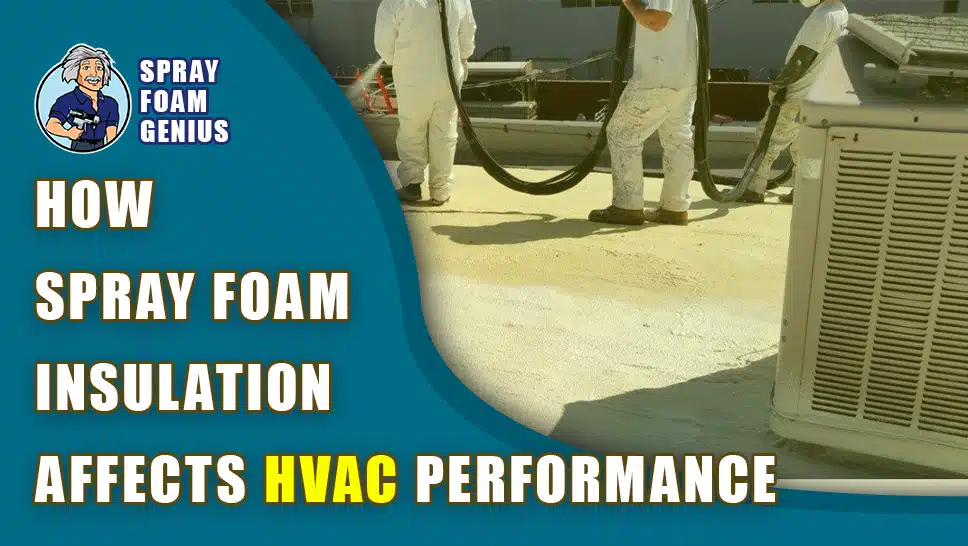
In the quest for energy efficiency and improved indoor comfort, spray foam insulation has become a standout choice for homeowners and business owners alike. At Spray Foam Genius Marketing, we specialize in providing marketing solutions tailored specifically for spray foam insulation contractors, but our expertise extends to understanding the significant impact of spray foam insulation on HVAC system performance. This in-depth guide will explore how spray foam insulation can revolutionize your HVAC system, offering insights into its benefits, addressing common concerns, and providing actionable advice for those considering this investment.
Understanding Spray Foam Insulation
What is Spray Foam Insulation?
Spray foam insulation is a cutting-edge insulation material that starts as a liquid and expands into a foam upon application. Composed primarily of polyurethane or polyisocyanurate, spray foam is known for its exceptional insulating properties. It is applied using a specialized spray gun, which mixes the foam components on-site. Once sprayed onto surfaces, the foam rapidly expands and hardens, creating a seamless and highly effective thermal barrier.
Types of Spray Foam Insulation
Spray foam insulation is categorized into two main types, each offering unique benefits:
- Open-Cell Foam: This type is lighter and more flexible, characterized by its sponge-like texture. Open-cell foam is ideal for applications where flexibility and soundproofing are desired. It is commonly used in interior wall cavities and attics.
- Closed-Cell Foam: This type is denser and more rigid, providing higher insulation values and excellent resistance to moisture. Closed-cell foam is often used in areas with high humidity or where additional structural reinforcement is needed, such as exterior walls and crawl spaces.
The Role of HVAC Systems in Buildings
What is an HVAC System?
An HVAC (Heating, Ventilation, and Air Conditioning) system is essential for maintaining a comfortable indoor environment. It regulates temperature, humidity, and air quality, ensuring that residential and commercial spaces remain conducive to living and working throughout the year. HVAC systems typically consist of several key components:
- Heating Units: These include furnaces or heat pumps that generate warmth to heat indoor spaces during colder months.
- Cooling Units: Air conditioners or cooling systems that remove heat from indoor spaces to maintain a comfortable temperature in warmer months.
- Ventilation Systems: This includes ductwork and fans that distribute conditioned air throughout the building, ensuring even temperature distribution and air quality.
- Thermostats: Devices that control the temperature settings and monitor indoor climate conditions to maintain desired comfort levels.
Importance of HVAC Efficiency
The efficiency of an HVAC system is crucial for several reasons:
- Energy Consumption: Efficient HVAC systems use less energy to maintain comfortable temperatures, which translates to lower utility bills.
- Comfort Levels: Properly functioning HVAC systems ensure consistent indoor temperatures, contributing to a more pleasant living or working environment.
- Equipment Longevity: An efficient system experiences less wear and tear, which can extend the lifespan of the equipment and reduce maintenance costs.
How Spray Foam Insulation Enhances HVAC Performance
Improved Energy Efficiency
One of the most notable benefits of spray foam insulation is its impact on energy efficiency. By creating a continuous air barrier, spray foam insulation:
- Reduces Air Leaks: Spray foam expands to fill gaps and cracks, effectively sealing any air leaks. This prevents conditioned air from escaping and unconditioned air from entering the building, reducing the workload on HVAC systems.
- Enhances Thermal Insulation: With its high R-value, spray foam insulation provides superior resistance to heat flow. This means that buildings stay warmer in winter and cooler in summer, reducing the need for continuous heating or cooling.
Lower Energy Bills
The enhanced energy efficiency provided by spray foam insulation leads to lower energy bills. By reducing the amount of energy required to maintain indoor temperatures, property owners can experience significant savings. For instance, homes and buildings insulated with spray foam can see a reduction in energy costs by up to 50% compared to those with traditional insulation materials.
Improved Comfort
Spray foam insulation contributes to a more consistent indoor climate by eliminating drafts and cold spots. This results in a more uniform temperature distribution throughout the building, reducing the need for frequent adjustments to the HVAC system. The result is a more stable and comfortable indoor environment.
Reduced HVAC System Wear and Tear
HVAC systems that operate under less strain tend to experience fewer issues. By improving insulation with spray foam, the burden on HVAC components is lessened, which can lead to a longer lifespan for the system. Reduced wear and tear can translate into fewer repairs and replacements, further enhancing cost savings over time.
Addressing Common Concerns
Cost vs. Benefits
Spray foam insulation may have a higher upfront cost compared to traditional insulation materials such as fiberglass or cellulose. However, the long-term benefits often outweigh the initial investment. The energy savings, increased comfort, and reduced HVAC maintenance costs make spray foam a cost-effective solution in the long run. When considering the overall return on investment, spray foam insulation proves to be a valuable addition to any building.
Installation Considerations
Proper installation is critical to maximizing the benefits of spray foam insulation. Working with experienced professionals is essential to ensure that the insulation is applied correctly. Issues such as uneven coverage, poor adhesion, or incorrect application can compromise the effectiveness of the insulation. It is advisable to select a contractor with expertise in spray foam insulation and to review their credentials and customer feedback.
Environmental Impact
Spray foam insulation is derived from petroleum-based products, which raises concerns about its environmental impact. However, many manufacturers offer eco-friendly alternatives, including low-VOC (volatile organic compounds) and water-blown spray foam. These options can help reduce the environmental footprint while still delivering the performance benefits of traditional spray foam insulation.
Practical Tips for Homeowners and Business Owners

Assessing Your Insulation Needs
Before investing in spray foam insulation, it is important to evaluate your specific needs. Factors to consider include:
- Age of the Building: Older buildings may have outdated insulation that can benefit significantly from spray foam.
- Existing Insulation Levels: Determine if your current insulation is sufficient or if there are gaps that need to be addressed.
- HVAC System Performance: An energy audit can provide insights into how spray foam insulation might improve HVAC efficiency.
Choosing the Right Contractor
Selecting a reputable contractor is crucial for ensuring high-quality installation. Look for contractors with experience in spray foam insulation and check their qualifications and customer reviews. A reliable contractor will provide a detailed estimate and explain the installation process, helping you make an informed decision.
Maintaining Your Insulation
Spray foam insulation generally requires minimal maintenance. However, periodic inspections are recommended to check for any signs of damage or deterioration. Addressing any issues promptly will help maintain the insulation’s effectiveness and ensure continued HVAC performance.
Experience the Benefits of Spray Foam Insulation
Spray foam insulation offers numerous benefits that can significantly enhance HVAC system performance. From improving energy efficiency to reducing maintenance costs, it provides a smart investment for both residential and commercial properties. If you are considering spray foam insulation for your building, contact us today to learn more about how we can help you achieve optimal results.
Contact Us for More Information
For expert advice on spray foam insulation and its impact on HVAC systems, reach out to Spray Foam Genius Marketing. Our team is here to assist you with all your spray foam insulation needs, from finding the right contractor to optimizing your HVAC system performance.
- Phone: 877-840-FOAM for USA and 844-741-FOAM for Canada
- Website: https://sprayfoamgeniusmarketing.com/
- Email: [email protected]
Discover the Difference Today!
Enhance your building’s energy efficiency and comfort with the power of spray foam insulation. Contact us now to explore how spray foam can transform your HVAC system performance and lead to long-term savings.
- How to Use Pinterest to Market Your Spray Foam Insulation Services - December 27, 2023
- How to Use LinkedIn to Grow Your Spray Foam Insulation Business - December 23, 2023
- How to Use Instagram to Showcase Your Spray Foam Insulation Projects - December 16, 2023

